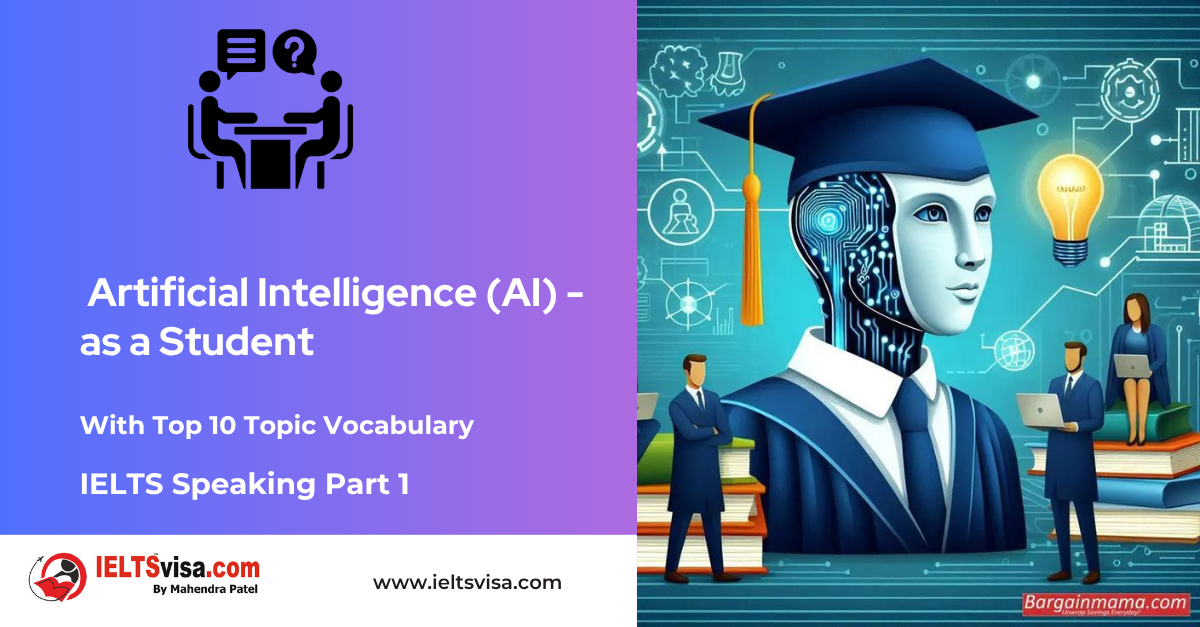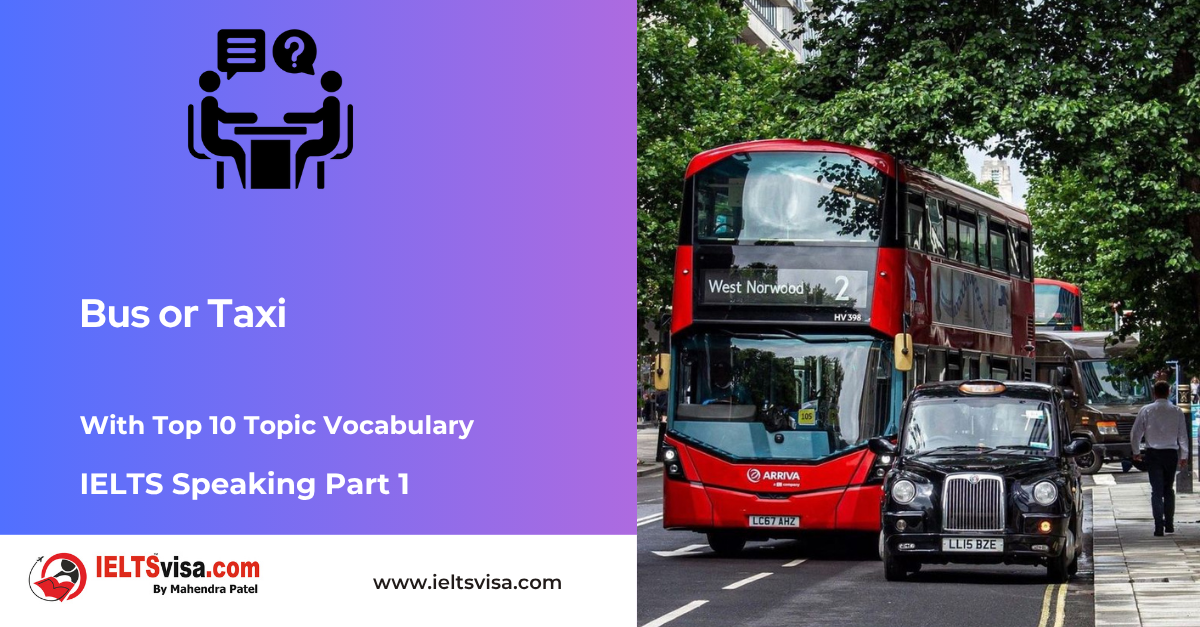IELTS Speaking Part 1 – Artificial Intelligence (AI) as a Student.
IELTS Speaking Practice
IELTS Speaking Part 1 – Artificial Intelligence (AI) as a Student.
Examiner: Do you think artificial intelligence is important in today’s world?
Candidate: Artificial intelligence is extremely important today. It plays a significant role in various fields such as healthcare, education, finance, and transportation, improving efficiency and enabling new possibilities.
Examiner: How often do you encounter AI in your daily life?
Candidate: I encounter AI quite frequently in my daily life. For example, I use virtual assistants like Siri or Google Assistant, recommendation systems on Netflix and YouTube, and smart home devices.
Examiner: Can you give an example of how AI is used in education?
Candidate: AI is used in education through personalized learning platforms that adapt to individual student’s learning pace and style. AI-driven tools like language learning apps and virtual tutors also provide additional support to students.
Examiner: What do you think are the advantages of using AI?
Candidate: The advantages of using AI include increased efficiency, the ability to handle large volumes of data, improved decision-making, and the automation of repetitive tasks, which allows humans to focus on more complex activities.
Examiner: Are there any disadvantages or risks associated with AI?
Candidate:There are several disadvantages and risks, such as job displacement due to automation, privacy concerns with data collection, and the potential for AI systems to make biased or unethical decisions.
Examiner: How do you feel about AI in healthcare?
Candidate: I feel that AI has great potential in healthcare. It can assist in diagnosing diseases, predicting patient outcomes, and personalizing treatment plans. However, ensuring that AI systems are accurate and reliable is essential.
Examiner: Do you think AI will replace human jobs in the future?
Candidate: AI will likely replace some human jobs, particularly those involving routine and repetitive tasks. However, it will also create new job opportunities in areas such as AI development, maintenance, and oversight.
Examiner: How can AI impact the transportation industry?
Candidate: AI can significantly impact the transportation industry by enabling self-driving cars, optimizing traffic management, and improving logistics and delivery systems, which can lead to safer and more efficient transportation.
Examiner: Are there any ethical concerns related to AI?
Candidate: There are several ethical concerns, including ensuring fairness and avoiding bias in AI algorithms, protecting user privacy, and making sure that AI is used responsibly and does not cause harm.
Examiner: What role does AI play in social media?
Candidate: AI plays a significant role in social media by personalizing content feeds, targeting advertisements, detecting fake news and harmful content, and enhancing user engagement through chatbots and recommendation systems.
Examiner: How do you think AI can benefit the environment?
Candidate: AI can benefit the environment by optimizing energy use, improving waste management, predicting and mitigating the effects of climate change, and enabling precision agriculture to reduce resource consumption.
Examiner: Do you think students should learn about AI in school?
Candidate: Students should learn about AI in school. Understanding AI technology and its implications is crucial for future careers and informed citizenship in an increasingly digital world.
Examiner: Can you name a popular AI technology or application you use?
Candidate: One popular AI application I use is the Google Photos app, which uses AI to organize and categorize my photos, making it easier to find specific images and create albums.
Examiner: How do you think AI will change the future of work?
Candidate: AI will change the future of work by automating routine tasks, enhancing productivity, and enabling new types of jobs that require advanced skills in AI development and human-AI collaboration.
Examiner: Are you optimistic or pessimistic about the future of AI?
Candidate: I am cautiously optimistic about the future of AI. While there are challenges and risks to address, the potential benefits of AI in improving our lives and solving complex problems are significant.
Top 10 Topic Vocabulary for“Artificial Intelligence (AI) as a Student”
”
|
Vocabulary |
Type |
Meaning |
Synonyms |
Antonyms |
Word Family |
Example Sentences |
|
Efficiency |
Noun |
The ability to accomplish a task with the least amount of effort |
effectiveness, productivity, effectiveness |
inefficiency, ineffectiveness, unproductivity |
efficient |
AI can improve efficiency in various industries. |
|
Personalized |
Adjective |
Tailored to a specific individual or group |
customized, individualized, bespoke |
standardized, generic, common |
personalization |
AI can provide personalized learning experiences. |
|
Automation |
Noun |
The use of machines to perform tasks that humans formerly did |
mechanization, robotization, computerization |
manual labour, manual work, handwork |
automate |
AI can automate many repetitive tasks. |
|
Decision-making |
Noun |
The process of making choices |
choice-making, option-making, selection |
decision |
AI can improve decision-making by analyzing data and identifying patterns. |
|
|
Job displacement |
Noun |
The loss of jobs due to technological advancements |
unemployment, job loss, joblessness |
job creation, employment growth, job expansion |
displace |
AI may lead to job displacement in some industries. |
|
Privacy concerns |
Noun |
Concerns about the protection of personal information |
privacy issues, data privacy, data protection |
privacy |
There are privacy concerns associated with AI data collection. |
|
|
Predict |
Verb |
Say or estimate what will happen in the future |
forecast, anticipate, foresee |
mispredict, underpredict, overpredict |
prediction |
AI can predict patient outcomes in healthcare. |
|
Optimize |
Verb |
Make the best use of available resources |
maximize, improve, enhance |
minimize, reduce, worsen |
optimization |
AI can optimize traffic management systems. |
|
Ethical concerns |
Noun |
Moral or philosophical issues that need to be considered |
moral dilemmas, ethical questions, ethical concerns |
ethical |
There are ethical concerns related to the use of AI. |
|
|
Engagement |
Noun |
The act of taking part in something |
involvement, participation, commitment |
disengagement, detachment, indifference |
engage |
AI can enhance user engagement on social media platforms. |

Our Books
Master IELTS Speaking Part 1
IELTS Writing Task 1 Book
IELTS Writing Task 2 Book
Practice IELTS Other Modules
IELTS Listening
The IELTS Listening test assesses how well you can understand spoken English in various contexts. It lasts about 30 minutes and is divided into four sections with a total of 40 questions. The listening tasks become increasingly difficult as the test progresses.
IELTS Academic Reading
The IELTS Academic Reading section assesses your ability to understand and interpret a variety of texts in academic settings. It is designed to evaluate a range of reading skills, including skimming for gist, reading for main ideas, reading for detail, understanding inferences, and recognizing a writer's opinions and arguments.
IELTS Speaking
The IELTS Speaking test assesses your ability to communicate in English on everyday topics. It lasts 11-14 minutes and consists of three parts: introduction, cue card, and a discussion based on the cue card topic.
IELTS General Reading
IELTS General Reading tests your ability to understand and interpret various types of texts. Here are some key areas and types of content you can expect to encounter in the reading section, along with tips for effective preparation.
IELTS Academic Writing Task 1
In IELTS Academic Writing Task 1, you are presented with a visual representation of information, such as graphs, charts, tables, or diagrams, and you are required to summarize, compare, or explain the data in your own words.
IELTS General Writing Task 1
In IELTS General Writing Task 1, you are required to write a letter based on a given situation. The letter can be formal, semi-formal, or informal, depending on the prompt. Here’s a breakdown of the key components to include in your letter
IELTS Academic Writing Task 2
In IELTS Academic Writing Task 2, you are required to write an essay in response to a question or topic. Here’s a guide to help you understand the essential elements of this task
IELTS Exam Tips
To succeed in the IELTS exam, practice regularly, familiarize yourself with the test format, improve your vocabulary, develop time management skills, and take mock tests to build confidence.
Grammer for IELTS
Grammar is the foundation of effective communication in English. Understanding tense usage, subject-verb agreement, and sentence structure enhances clarity and coherence in writing and speaking.
Vocabulary for IELTS
Vocabulary plays a crucial role in the IELTS (International English Language Testing System) exam, especially in the Speaking and Writing sections. Here’s an overview of why vocabulary is important and how it impacts your performance
RECENT IELTS SAMPLES QUESTIONS AND ANSWERS
IELTS Speaking Part 1 – Boats
IELTS Speaking Part 1 - Boats Examiner: Have you ever been on a boat?Candidate: Yes, I have been on a boat a...
IELTS Speaking Part 1 – Books
IELTS Speaking Part 1 - Books Examiner: Do you like reading books?Candidate: Yes, I enjoy reading books very...
IELTS Speaking Part 1 – Bus or Taxi
IELTS Speaking Part 1 - Bus or Taxi Examiner: How do you usually get around town?Candidate: My preferred mode...
IELTS Speaking Part 1 – Celebrity (Indian)
IELTS Speaking Part 1 - Celebrity (Indian) Examiner: Do you have a favourite celebrity?Candidate: My favourite...
IELTS Speaking Part 1 – Celebrity – Sports (Indian) – Virath Kohali
IELTS Speaking Part 1 - IELTS speaking part 1 - Celebrity - Sports (Indian) - Virath Kohali Examiner: Who is...
IELTS Speaking Part 1 – Artificial Intelligence (AI) as a Singer
IELTS Speaking Part 1 - Artificial Intelligence (AI) - As a Singer Examiner: How do you see AI impacting the...













